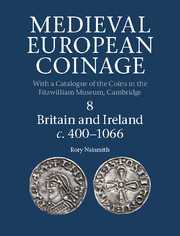Book contents
- Frontmatter
- Contents
- List of plates
- List of figures
- List of maps
- List of tables
- Preface
- Note on spelling
- List of abbreviations
- 1 Introduction
- 2 From Roman Britain To Anglo-Saxon England
- 3 Early Anglo-Saxon Gold Coinage
- 4 The Early Silver Pennies
- 5 The Kingdom Of Northumbria
- 6 The ‘Mercian Supremacy’ In The Age Of Offa And Coenwulf
- 7 The Rise Of Wessex In Southern England
- 8 The Reign Of Alfred The Great
- 9 England From Edward The Elder To Edgar's Reform
- 10 The Late Anglo-Saxon Coinage
- 11 The Anglo-Viking Coinages
- 12 Wales And Scotland
- 13 The Isle Of Man And ‘Irish Sea’ Coinages
- 14 Ireland To 1170 (with Andrew Woods)
- APPENDICES
- Bibliography
- CATALOGUE
- Concordances
- Indexes
8 - The Reign Of Alfred The Great
Published online by Cambridge University Press: 11 May 2017
- Frontmatter
- Contents
- List of plates
- List of figures
- List of maps
- List of tables
- Preface
- Note on spelling
- List of abbreviations
- 1 Introduction
- 2 From Roman Britain To Anglo-Saxon England
- 3 Early Anglo-Saxon Gold Coinage
- 4 The Early Silver Pennies
- 5 The Kingdom Of Northumbria
- 6 The ‘Mercian Supremacy’ In The Age Of Offa And Coenwulf
- 7 The Rise Of Wessex In Southern England
- 8 The Reign Of Alfred The Great
- 9 England From Edward The Elder To Edgar's Reform
- 10 The Late Anglo-Saxon Coinage
- 11 The Anglo-Viking Coinages
- 12 Wales And Scotland
- 13 The Isle Of Man And ‘Irish Sea’ Coinages
- 14 Ireland To 1170 (with Andrew Woods)
- APPENDICES
- Bibliography
- CATALOGUE
- Concordances
- Indexes
Summary
HISTORICAL INTRODUCTION
Alfred the Great is the most celebrated English ruler of the pre-Conquest period, remembered for staving off the Vikings, eventually bringing the surviving English territories under a single king and initiating an ambitious programme of intellectual revival (general studies include Abels 1998; Wormald 2004; Pratt 2007a; Discenza and Szarmach 2015; key sources are translated in Keynes and Lapidge 1983). He has entered into popular consciousness as a figurehead of English culture and nationhood: the ‘cult of Alfred’, which grew up around him in the sixteenth century and persists to the present day, is a historical phenomenon in and of itself (Keynes 1999a; Yorke 2003; Parker 2007; Stanley 1981).
Nonetheless, the early phase of Alfred's reign was far from auspicious. When Alfred inherited the throne from his brother (the fourth son of Æthelwulf to do so in succession: see Table 13, p. 176) in 871, Wessex was in a precarious position, threatened by the frequent incursions of the Viking ‘Great Army’ (Brooks 1979; Pratt 2007a, 93–111). Mercia fared even more poorly around this time: Burgred, king of the Mercians (852–74) was driven out of his kingdom into exile in 874, and the Vikings replaced him with Ceolwulf II (and later took the eastern part of the kingdom for themselves to settle in 877). Alfred came perilously close to the same fate as Burgred when a sudden attack on Wessex by the Vikings in 878 caught him off guard while he was at the royal estate of Chippenham, and the kingdom was temporarily overrun. Later that year he emerged from exile to win a surprise victory over the invaders at Edington. Their leader, Guthrum, accepted baptism, with Alfred standing as his godfather, and then returned to East Anglia, where a portion of the Viking army had settled.
Other Viking forces threatened Alfred later in his reign, though never coming as close to conquest as they had in 878. A programme of fortification of strategic points, accompanied by careful organisation of available manpower, probably explains much of the later English military success when a major Viking army moved across the Channel from Francia in 892 (Hill and Rumble 1996; Abels 1998; 2003; Lavelle 2010; 2012).
- Type
- Chapter
- Information
- Medieval European Coinage , pp. 165 - 173Publisher: Cambridge University PressPrint publication year: 2017



